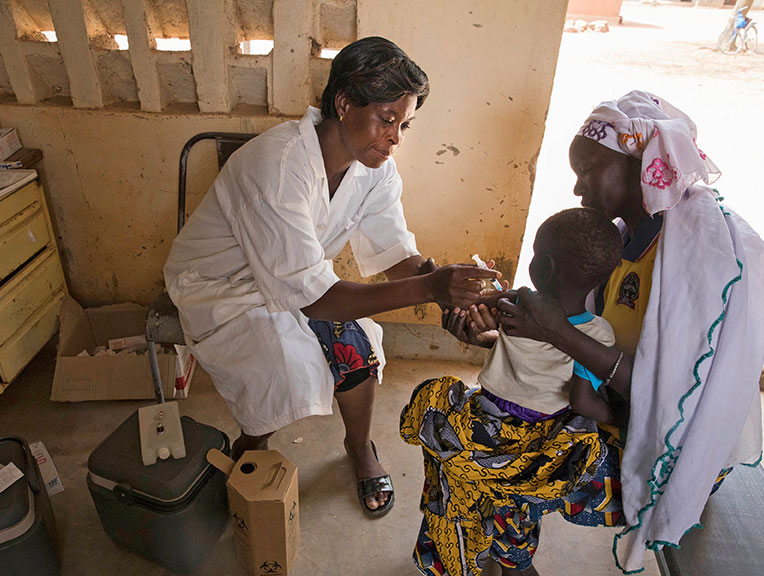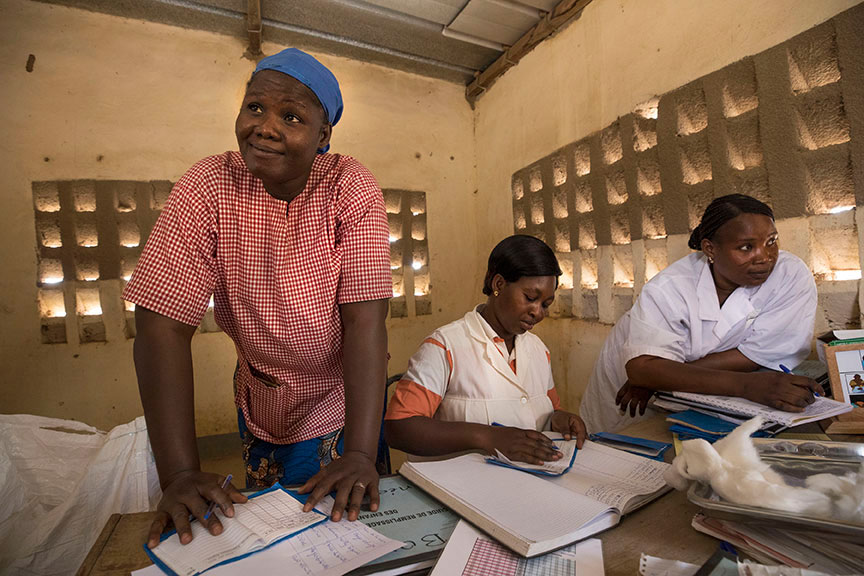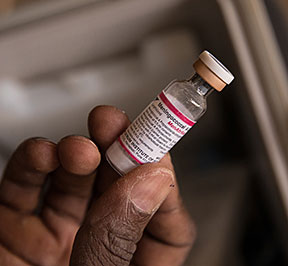You are here
Partnership Works to Protect Burkina Faso from Meningitis A
The thermometer nears 95 degrees at 8:00 a.m. in Laye, Burkina Faso, a small village about 20 miles from the capital city of Ouagadougou. Though the temperature will top 105 degrees today, the heat has not kept the mothers of a few dozen children from walking or biking to their local dispensary. The women are here to ensure their children receive vaccines to protect them from contracting a number of preventable diseases, including meningococcal meningitis. In March, MenAfriVac™, a vaccine that protects against serogroup A meningococcal (MenA) meningitis, became a required component of routine immunization for 15-month-old children in Burkina Faso.

While the mothers patiently wait on the nurses to prepare the vaccinations, a number of the toddlers in the cramped brick building have a sense that something is up. And soon, the first child is called forward and receives his vaccination against MenA meningitis, a disease that for years has presented an incredible burden to many countries in sub-Saharan Africa. The child’s crying starts in rapid bursts but soon slows. His mother is comforted because she knows that the cause of her child’s brief pain will protect him from the disease for the next 10 years.
That’s not something families in Burkina Faso could take for granted less than a decade ago. Wambi Zonga is a 53-year-old father who lives with his family in a small compound a short walk from the Laye Dispensary. He attests to the fear and brutal nature of meningitis, which can cause a variety of health issues from severe brain damage to loss of limbs, even death.
“We knew that something very bad was wrong with her,” said Mr. Zonga, referring to his daughter, Payan, who was four months old at the time.
We took her to the clinic and they sent us to the hospital in Ouagadougou. The doctors did a test and told us she had meningitis. She stayed in hospital for 30 days, which was very costly to our family.
Now 13, Payan is unable to hear or speak and has trouble walking. Though she has never been able to attend school, her brother proudly says she is smart and is now learning her numbers, which she writes in the dirt under a mango tree in the family’s yard. But there are challenges for Payan and her family, which require that her grandmother care for her on a regular basis during the day. While the severe MenA meningitis outbreak that infected Payan occurred in the early 2000s, she and her family have suffered its aftereffects in the ensuing years and will continue to do so for years to come.
 Thankfully, the Zonga family’s suffering is much less common now. Since 2010 when Burkina Faso had one of the highest rates of meningitis in the world, Men A meningitis has become less of a burden there. That’s when MenAfriVac™, a new vaccine against MenA meningitis, was introduced to the citizens of Burkina Faso and other sub-Saharan African countries. MenAfriVac™ is designed specifically for Africa and is produced and administered at a low price, making it affordable for mass usage.
Thankfully, the Zonga family’s suffering is much less common now. Since 2010 when Burkina Faso had one of the highest rates of meningitis in the world, Men A meningitis has become less of a burden there. That’s when MenAfriVac™, a new vaccine against MenA meningitis, was introduced to the citizens of Burkina Faso and other sub-Saharan African countries. MenAfriVac™ is designed specifically for Africa and is produced and administered at a low price, making it affordable for mass usage.
Mr. Zonga says his other children participated in the large-scale MenAfriVac™ vaccination campaign in the country in 2010. Now, seven years later, all indications show this vaccine has been a tremendous success. Since 2013, the Centers for Disease Control and Prevention (CDC) has worked with the Burkina Faso Ministry of Health and the CDC Foundation to conduct a five-year project to strengthen case-based surveillance of meningitis and measure the impact of MenAfriVac™. This effort, called MenAfriNet, is designed to guide research on the vaccine’s effectiveness and herd immunity—as well as to see if any other types of meningitis emerge. Other countries taking part in MenAfriNet include Mali, Togo, Niger and Chad. Funding for MenAfriNet is provided by the Bill & Melinda Gates Foundation through a grant to the CDC Foundation.
“A challenge in Burkina Faso was to continue high-level case-based surveillance of meningitis over an extended period,” said CDC’s Ryan Novak, who serves as director for MenAfriNet. “The team in Burkina Faso’s Ministry of Health has taken ownership of this effort and has worked with us to create a national meningitis surveillance system capable of providing the information necessary to guide country programs to reduce meningitis disease and epidemics while also playing a leadership role in the West African region.”
 April 24, 2017, is World Meningitis Day. It’s an appropriate time to remember the millions who have died from or suffered the effects of the disease as well as to reflect on the accomplishments MenAfriVac™ and MenAfriNet. However, a current outbreak of another type of meningococcal meningitis in Nigeria that has thus far killed 745 people reminds us that more work must be done to protect children like, Payan, from this deadly, debilitating disease.
April 24, 2017, is World Meningitis Day. It’s an appropriate time to remember the millions who have died from or suffered the effects of the disease as well as to reflect on the accomplishments MenAfriVac™ and MenAfriNet. However, a current outbreak of another type of meningococcal meningitis in Nigeria that has thus far killed 745 people reminds us that more work must be done to protect children like, Payan, from this deadly, debilitating disease.
Today, there is hope. A promising effort is underway to address other common types of meningococcal meningitis through a new, affordable vaccine—a development that, if successful, would drastically reduce the burden of meningococcal meningitis in Burkina Faso, sub-Saharan Africa and other areas around the globe.
Photos: Evelyn Hockstein/CDC Foundation
